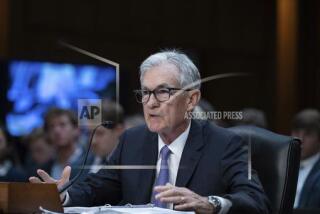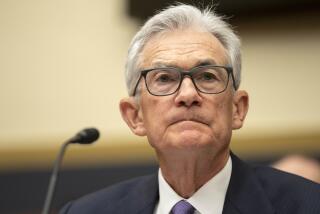Volcker Says That Fed Has Reached Limit in Easing Money Supply
WASHINGTON â Federal Reserve Chairman Paul A. Volcker on Wednesday defended the central bankâs decision to maintain its relatively generous supply of credit as the best way of preventing additional weakening in the economy, but he warned that the Fed cannot relax its grip further.
âWeâve done all we can without disturbing the inflation outlook,â Volcker told a House Banking subcommittee in conjunction with his testimony on the Fedâs semi-annual report to Congress on monetary policy.
But, he warned that, if the value of the dollar continues to fall rapidly, the Fed might be forced to toughen its stance, because a plunging currency increases the danger that inflationary expectations would be revived. But if the dollar plummets in value, imports become more expensive--not only raising the cost of living for those who purchase foreign goods but also reducing the competition that holds down prices on American-made products.
âThe possibility that sentiment toward the dollar could change adversely, with sharp repercussions in the exchange rate in a downward direction, poses the greatest potential threat to the progress we have made against inflation,â Volcker testified. âThose risks would only be compounded by excessive monetary and liquidity creation.â
No Prediction on Rates
The dollar, which declined sharply in early trading Wednesday, recovered some of its lost ground as currency traders concluded from Volckerâs testimony that interest rates were bottoming out and that the Fed expects a rebound in U.S. economic growth. At the same time, traders were influenced by Volckerâs remarks indicating that the Fed would be forced to move to counteract any steep fall in the U.S. currency.
Following his usual pattern, Volcker declined to predict future interest rates, suggesting that rates could fall from current levels only if the economy remains weak. But he said he expects the economy to improve in the second half of the year to a gross national product growth range of â4% plusâ--implying that the Fed must wait and see how the economy develops before shifting its current monetary stance.
âThe Fed remains in a holding pattern,â David Levine, chief economist at the New York investment firm Sanford C. Bernstein & Co., said in an interview.
Other economists agreed that the Fed is uncertain about what it should do next, partly because such commonly used measures as the money supply are not behaving normally and partly because some sectors of the economy are severely depressed while others are thriving.
âThe Fed is juggling a lot of balls on policy,â said Allen Sinai, chief economist at Shearson Lehman Bros., a New York brokerage house. âThe central bank is itself confused about what should drive monetary policy, and compounding the problem is that the economy has developed a split personality.â
Call to Reduce Deficit
Volckerâs comments came a day after the Fed disclosed that it will allow more money to be pumped into circulation during the rest of the year, ignoring a recent bulge in the money supply that otherwise might have forced it to push up interest rates to slow such growth.
Responding to a question from the congressional panel, Volcker said that only one of the 12 members of the Federal Open Market Committee opposed the higher target for M1, a key money supply measure that includes cash and checking accounts.
In his testimony, Volcker again urged Congress to substantially reduce the federal budget deficit. At the same time, he called on other major industrial nations to stimulate their own economies to take up the slack in the United States.
Warning of âgross imbalances that can neither be sustained indefinitely nor dealt with successfully by monetary policy alone,â Volcker devoted a substantial part of his testimony to explaining why the nationâs huge trade deficit cannot be eliminated until the budget deficit is substantially narrowed.
Without serious budget cuts, a major decline in the U.S. dollar on world currency markets might relieve the pressure on agriculture and heavy industry--but only at the expense of rising interest rates, he argued. In turn, he said, that would bring the housing industry to a screeching halt and damage other sectors of the economy.
âThe hard fact remains that, so long as we run massive budgetary deficits, we will remain dependent on unprecedented capital inflows to help finance . . . that deficit,â Volcker said. âThe net capital inflows will be mirrored in a trade deficit--they are Siamese twins.â
Volcker again called on Congress to cut about $50 billion from an expected fiscal 1986 budget deficit of more than $200 billion. But he suggested that, even if Congress falls short of the goal, almost any budget agreement would be better than none.
By contrast, he called on other countries to adopt more expansionary policies domestically so that they would no longer be as dependent on U.S. demand for foreign goods.
More to Read
Inside the business of entertainment
The Wide Shot brings you news, analysis and insights on everything from streaming wars to production â and what it all means for the future.
You may occasionally receive promotional content from the Los Angeles Times.










